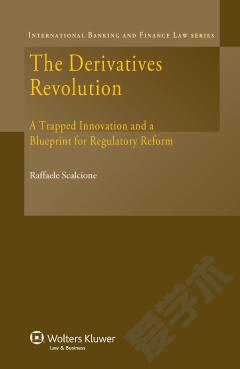The Derivatives Revolution —— A Trapped Innovation and a Blueprint for Regulatory Reform
----- 衍生金融工具的革命。被困创新和规制改革的蓝图
It is now widely recognized that an uncontrolled “derivatives revolution” triggered one of the most spectacular worst-case scenarios of modern times. This book – the most cogent legal analysis of the subject yet to appear in any language – lays bare the core role played by the failure to adequately regulate derivatives in the financial crisis of recent years. The author’s insistence that derivatives must be viewed not as profit-seeking investments but as risk management tools – and his well-grounded prescriptions to ensure that they are regulated in that way – sheds clear light on the best way for companies, financial institutions, and hedge funds to move forward in their use of these useful but highly hazardous instruments. This book clearly shows how such elements as the following fit into the legal analysis of derivatives, and how proper regulation will preserve their usefulness and economic value: ; derivatives allow for the most efficient and cost-effective risk fractioning, hence risk taking, techniques ever conceived; derivatives allow for all measurable and identifiable risks that may exist in modern finance; the ability to isolate risks and insure against risk exposures is the key to the very survival of modern financial markets; risk buyers effectively take on financial exposure to various types of risk while hedgers unload unwanted exposures; derivatives allow domestic investors to acquire exposure to foreign markets without the necessity of dealing with foreign laws, foreign investments, currency exchange, or foreign fiscal regimes; derivatives increase social welfare by making it easier and less expensive to carry out many types of financial transactions; derivatives allow governments to insulate, manage, hedge or concentrate risks deriving from financial, meteorological, and even geopolitical exposure; and derivatives allow radical changes to financial and risk structure to be performed silently and rapidly. To the question: how do we ensure that a company trading derivatives is regulated effectively? this work offers a clear and convincing answer. The author’s detailed recommendations for regulatory and corporate governance measures are designed to prevent excessive risk taking, the emergence of rogue traders, and ultimately the emergence of another systemic disturbance caused by chains of derivatives-related losses.
{{comment.content}}








 京公网安备 11010802027623号
京公网安备 11010802027623号